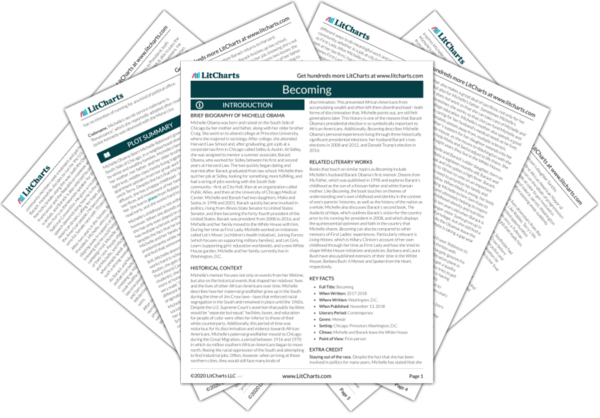Michelle’s mother Quotes in Becoming
Now that I’m an adult, I realize that kids know at a very young age when they’re being devalued, when adults aren’t invested enough to help them learn. Their anger over it can manifest itself as unruliness. It’s hardly their fault. They aren’t “bad kids.” They’re just trying to survive bad circumstances.

Unlock explanations and citation info for this and every other Becoming quote.
Plus so much more...
Get LitCharts A+He’d been promptly picked up by a police officer who accused him of stealing it, unwilling to accept that a young black boy would have come across a new bike in an honest way. (The officer, an African American man himself, ultimately got a brutal tongue-lashing from my mother, who made him apologize to Craig.) What had happened, my parents told us, was unjust but also unfortunately common. The color of our skin made us vulnerable. It was a thing we’d always have to navigate.
As I was entering seventh grade, the Chicago Defender, a weekly newspaper that was popular with African American readers, ran a vitriolic opinion piece that claimed Bryn Mawr had gone, in the span of a few years, from being one of the city’s best public schools to a “run-down slum” governed by a “ghetto mentality.” Our school principal, Dr. Lavizzo, immediately hit back with a letter to the editor, defending his community of parents and students and deeming the newspaper piece “an outrageous lie, which seems designed to incite only feelings of failure and flight.”
“I’m just not fulfilled,” I said.
I see now how this must have come across to my mother, who was then in the ninth year of a job she’d taken primarily so she could help finance my college education, after years of not having a job so that she’d be free to sew my school clothes, cook my meals, and do laundry for my dad, who for the sake of our family spent eight hours a day watching gauges on a boiler at the filtration plant.

Michelle’s mother Quotes in Becoming
Now that I’m an adult, I realize that kids know at a very young age when they’re being devalued, when adults aren’t invested enough to help them learn. Their anger over it can manifest itself as unruliness. It’s hardly their fault. They aren’t “bad kids.” They’re just trying to survive bad circumstances.

Unlock explanations and citation info for this and every other Becoming quote.
Plus so much more...
Get LitCharts A+He’d been promptly picked up by a police officer who accused him of stealing it, unwilling to accept that a young black boy would have come across a new bike in an honest way. (The officer, an African American man himself, ultimately got a brutal tongue-lashing from my mother, who made him apologize to Craig.) What had happened, my parents told us, was unjust but also unfortunately common. The color of our skin made us vulnerable. It was a thing we’d always have to navigate.
As I was entering seventh grade, the Chicago Defender, a weekly newspaper that was popular with African American readers, ran a vitriolic opinion piece that claimed Bryn Mawr had gone, in the span of a few years, from being one of the city’s best public schools to a “run-down slum” governed by a “ghetto mentality.” Our school principal, Dr. Lavizzo, immediately hit back with a letter to the editor, defending his community of parents and students and deeming the newspaper piece “an outrageous lie, which seems designed to incite only feelings of failure and flight.”
“I’m just not fulfilled,” I said.
I see now how this must have come across to my mother, who was then in the ninth year of a job she’d taken primarily so she could help finance my college education, after years of not having a job so that she’d be free to sew my school clothes, cook my meals, and do laundry for my dad, who for the sake of our family spent eight hours a day watching gauges on a boiler at the filtration plant.











